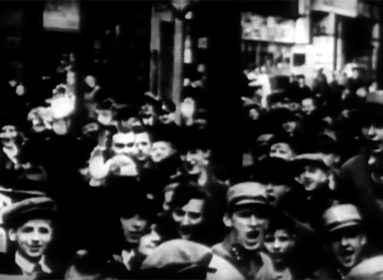By Cindy Mindell
SIMSBURY – Cantor Mark Perman likes to find the spiritual dimension in just about any musical genre. The Brooklyn native has been steeped in music and the performing arts since childhood, when he acted on Broadway in Shenendoah, toured with TheatreWorks USA, and appeared in TV commercials, and graduated from the High School of Performing Arts in Manhattan.
While he was a congregant at B’nai Jeshurun in Manhattan in the early ‘90s, Perman began to discover that inspiration can come from many sources. He was working in radio with several conservative personalities, including Rush Limbaugh. “I was like a ping-pong ball: I’d work all week with Rush, then spend Shabbat with the extremely liberal Rabbi Marshall Meyer,” he says. “I learned how different people can inspire you, no matter how opposed their world views might be.”
Perman entered the cantorate as a way to gather these various muses and bridge the gap between his theater and broadcasting background and his Jewish spiritual life. He received ordination in 1997 and spent nearly 15 years on radio, onstage, in film, and on the bimah before joining FVJC in 2011. His one-man show, Bima to Broadway, tells the story of these two musical worlds.
This eclectic approach to music is what inspired Perman to invite composer and musician David Sanders as scholar-in-residence. A tenured professor in the Montclair State University School of Communication and Media, Sanders has written electro-acoustic scores for film, TV, commercials, modern dance, and multimedia. As an engineer and producer, he has worked on a mix of musical projects ranging from classical to jazz to R & B. His most recent work focuses on creating musical settings for Jewish, Christian and Islamic sacred texts.
“My goal is always to create music and prayer opportunities that are participatory, spiritual, and meaningful,” says Perman. “David’s compositions are inherently Jewish and, at the same time, hold universal appeal. Some speak to the meaning behind the Jewish texts; others are Jewish liturgical pieces set to music, and he also sets non-Jewish texts to music.”
For the last 20 years, Sanders has served as director of the National Music Council, an umbrella organization of 50 of the nation’s most prestigious music associations chartered by Congress in 1956. In that role, Sanders has directed the music for the New Jersey Rally and Vigil for Darfur, where he conducted a 70-voice interracial, inter-generational choir who performed two of his original compositions. He produces the council’s annual Leadership in Music symposium and American Eagle Awards in New York City, and is the United States representative to the International Music Council of UNESCO.
The scholar-in-residence program will engage a range of musicians, from Sanders and fellow professional guest performers, to the FVJC choir, to congregant-musicians and the congregation at large.
“Presenting this kind of music is a way to welcome people to the synagogue as a place where they’re not hearing the same melodies all the time and not feeling like they’re watching a performance,” Perman says. “You’re asked to engage and see that the niggun [melody] has a universal appeal and can move you. It’s not just something Chasidim or the older generation of Jews sing, but something that has a relevancy today.”
The Friday night program includes professional klezmer clarinetist Walter Mamlok, guitarist Shay Bachar, and drummer Jason Bush. Saturday night features a performance of spiritual chant, Jewish tunes, and popular folk melodies, highlighting the spiritual element of musicians like James Taylor and John Denver.
“I think music should move and inspire and touch and shake people up a little,” says Perman. “I don’t want them to leave services saying only, ‘Oh, that was nice.’”
First Annual Lorne Rosovksy Scholar-in-Residence Shabbat with David Sanders: Friday-Shabbat, Mar. 28-29, Farmington Valley Jewish Congregation-Emek Shalom, 55 Bushy Hill Road, Simsbury. For information call (860) 658-1075 or visit fvjc.org.







 Southern New England Jewish Ledger
Southern New England Jewish Ledger














